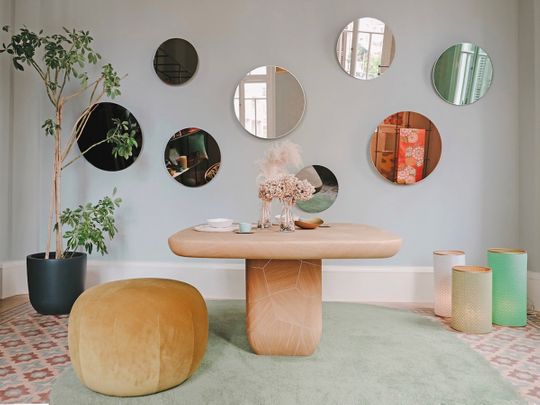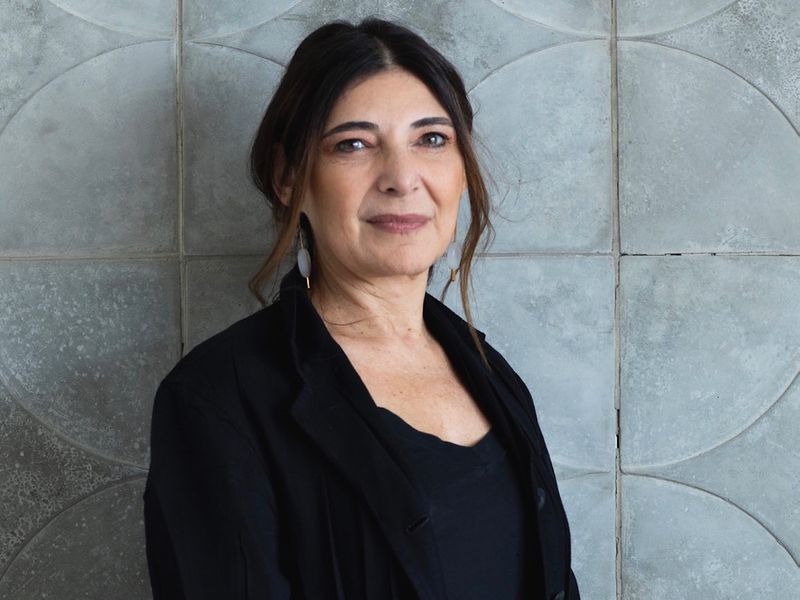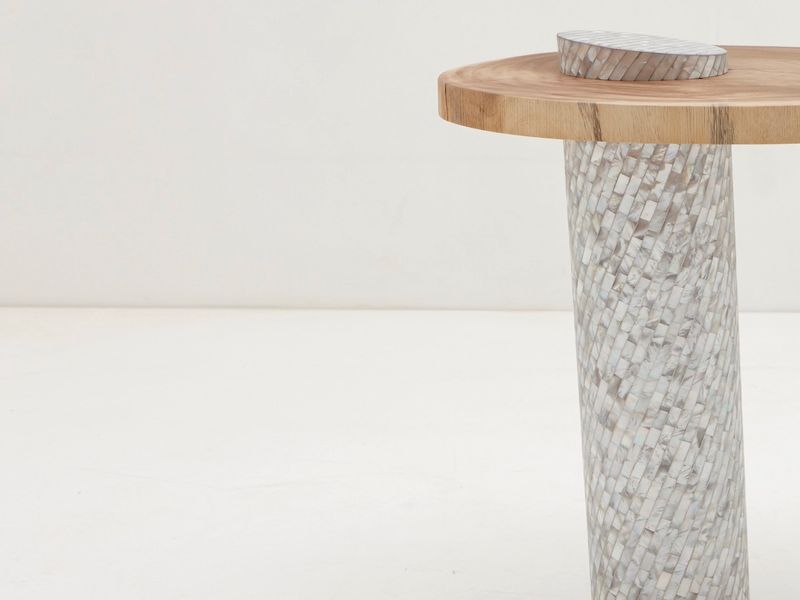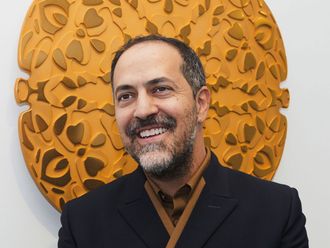
Designer Nada Debs reveals how her handmade creations will delight at the design fair as she celebrates 20 years of her brand
There’s a gut-level aesthetic seduction related to craftsmanship. From the feel of French oak that tells the story of fine handiwork to the sight of intricate marquetry, furniture is best served with artisanal charm. The operative word is ‘handmade’ because, as Nada Debs says, it’s the hand that tells us the story of the past and infuses objects with a sense of nostalgia.
This reverence for the human touch is central to the Lebanese designer’s vision at her eponymous studio that offers the allure of Eastern artisanship with a contemporary spirit. “We follow the ‘handmade and heart-made’ tagline because everything we do is human-centric,” she says. Nada’s aesthetic vocabulary combines mechanical ingenuity and operational delight in pieces that celebrate a sense of longing and belonging.

“My vision has always been to place value on people, not on products. Human stories behind craftsmanship and the age-old tradition of crafts being passed down from one generation to the next breathe life into every piece we create.” Not only does Nada’s body of work nod to form and function, but also prioritises evoking a feeling. She uses Islamic geometric art for its rhythmic appeal and how its circular pattern represents the primordial symbol of unity and the ultimate source of all diversity in creation.
She grew up in Japan, with the country’s less-is-more aesthetic often an underlying thread of her work. She studied at the Rhode Island School of Design in the United States and travelled the world, finding connections between different cultures. Nada, who is now celebrating 20 years of her brand that’s a crossover between art, design and fashion, has recently set up base in Dubai Design District. “The idea is to remain connected to people here and share my design values with the city and the region,” shares Nada, who is gearing up to participate at the upcoming iteration of Dubai Design Week.
“It made perfect sense for us to participate at Dubai Design Week this year, especially since we have presence in the city now and I’m more readily available for in-person consultations and appointments,” says Nada, who has long been based out of Beirut. With the brand spanning two decades, it’s fitting that its showcase at the fair will offer a retrospective glance at some of its most iconic furniture pieces.
“We’ll also be revealing several new collectible items, representing craft techniques featuring embroidery and organic wood. We use natural materials to create designs that are at once trendy and timeless,” Nada adds. “These luxurious pieces reflect on our brand’s ethos, supporting marginal craft communities and bolstering the position of traditional craftsmanship in the region whilst making it relevant for future generations.”
She holds that regional platforms like Dubai Design Week are integral to positioning local designers in the global creative ecosystem. “They help promote a cohesive and progressive society that flourishes based on arts and culture, dialogue, and inclusion. Creatives like us stand to benefit from them because we can identify trends and gauge our stance with respect to the world. As a design community, it’s important that we keep abreast of different perspectives.

Nada has an intrinsic relationship with the UAE, having created furniture pieces using traditional Middle Eastern craft techniques in 2021 for the country’s mission to the United Nations in New York, USA. Last year, she collaborated with social enterprise 81 Designs for the On Belonging collection, which featured seven Crafted Pebble chairs and Straw lamps, inspired by Palestinian artist Nabil Anani’s In Pursuit of Utopia. As a tribute to the UAE’s 50th anniversary, the seven pieces represented the seven Emirates, and were showcased at Abu Dhabi Art (17-21 November 2021). She joined forces with the Sharjah-based Irthi Contemporary Crafts Council for Zenobia, which was unveiled at Milan Design Week 2022. The collection features three multi functional bowls that are an interpretation of the vessels traditionally carried by Bedouin women, initiating a dialogue between the two distinct crafts of Talli and marquetry. Whilst the former commonly involves women hand-weaving wool threads, the latter is predominantly practiced by men, who produce wooden cross-sections that are assembled together and shaved using machine tools. The mélange of crafts and use of solid oak unite the expertise and journey of craftsmen and craftswomen from different parts of the region.
In 2017, Nada collaborated with the Fatima Bint Mohamed Bin Zayed (FBMI) Initiative for a carpet collection aimed at empowering women weavers in Afghanistan. Inspired by Jalal al-Din Rumi’s meditative words, ‘Apparently two, but one in soul’, the line offers a unique coming together of Afghan crafts and Nada’s contemporary design language. Nada recently worked with Romanian ceramic artist Rina Jaber for an installation titled Migration of the Butterflies. It’s bedecked with her signature mother-of-pearl butterflies inlaid onto concrete surfaces, alluding to the mass migration of Lebanese citizens owing to challenging living conditions over the last few years. Hard-hitting and contemplative, the piece explores the complexity of human emotions and the idea of loss, not only due to mass migration but also death, tragedy, political instability and the transience of life.
Among the centrepieces of Nada’s work is Keeping It Together, which was envisioned in the wake of the harrowing 2020 Beirut explosion. The line includes pieces that were recreated using the debris from the damaged floor at the Nada Debs studio space. A bowl, for instance, was made using pieces of glass that were broken due to the impact of the blast.
“With this collection, we turned our pain into hope. It was about how we kept it together despite the challenges we faced and are still facing,” she notes. Despite the aftermath of the explosion, Nada and her team remain unfettered. “We worked harder than before, and our work became more purposeful as it was a fight for survival. We continue to work with local artisans and aim to keep them motivated, overcoming difficult times with hope, passion and creativity.” Nada finds solace in the cultural scenes of Lebanon and the UAE, especially as the global appetite for the region’s cultural production is now more ravenous than ever.
“I think there’s an interesting exploration of the talent in both countries, and we see a new wave of homegrown brands emerging to the fore. People are also looking inwards to gather their creative thoughts,” she states. “In Lebanon, we’re challenged because of the political and economic situation. Dubai has a futuristic approach and is promoting Middle Eastern talent. Though there are differences in the creative realms of both countries, I see ample opportunities waiting to be explored. They bring us closer together and help us appreciate cultural diversity.”
At her atelier in Beirut’s chic Gemmayze neighbourhood, Nada leads a sizeable team of designers who work closely with craftspeople to realise the clients’ vision, sourcing natural materials from local suppliers who import them from locations including Costa Rica, the Philippines, and across Africa. “I started alone and now I have a team of 20 people,” she shares. “We also offer interior design services, and bespoke commissions of furniture, decoratives, artworks, and jewellery, among other things. The challenge is living and producing in Beirut, owing to the ongoing socioeconomic crisis, but it’s also full of inspiration. It’s the survival instinct that keeps us going.”
Nada is currently working on a more lifestyle-based approach, incorporating collectible pieces of furniture and accessories into interior design. “We have many requests for customised pieces and corporate gifting, and the vision is to elevate crafts for an international audience, seeking a sense of belonging for their Arab roots,” she shares. Among Nada’s greatest milestones is to have started from scratch and working her way up. “I began my career journey from home, then opened a small studio in Downtown Beirut, and then launched a second studio with a larger place combining retail and design. We’ve now established our presence in Dubai, so we’ve grown from strength to strength. As a craft custodian, I look forward to being a representative of the region and elevating local crafts.”






